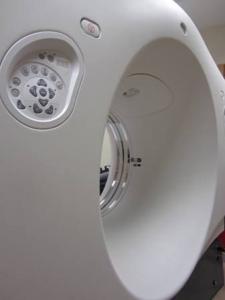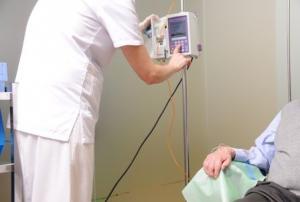Colon and rectum cancer
Introduction
Colorectal cancer is the most common gastrointestinal malignancy. It most often develops in the colon (about 70% of cases) and less frequently in the rectum (30%).
It is a cancer that can be prevented and cured in a high percentage of cases when diagnosed early on. In most patients this type of tumor begins to develop from a polyp that, although initially it is a benign lesion, some subtypes can become cancerous.
iTAcC’s medical team has extensive experience in the diagnosis and treatment of colorectal tumors, as well as prevention and genetic counseling in hereditary forms of the disease like familial adenomatous polyposis, Lynch syndrome (hereditary non-polyposis) and Peutz-Jeghers syndrome.
Risk factors
The principal risk factors of colorectal cancer are:
- Age: about 90% of diagnosed patients are older than 50.
- Family history: The risk increases if there are cases of colorectal cancer or adenomatous intestinal polyps in a family member (especially parents and siblings).
- Inflammatory bowel disease: Ulcerative colitis and Crohn’s disease.
- Smoking more than 35 packs per year.
- Habitual consumption of alcoholic beverages.
- Being overweight and a sedentary lifestyle have been associated with an increased risk of colorectal cancer.
- The risk increases with a diet high in fat (animal) and is reduced with a diet rich in fruits and vegetables.
Primary prevention
Correcting modifiable risk factors such as diet, lack of exercise, tobacco, alcohol etc., is considered ideal.
Secondary prevention
The removal of precancerous lesions (polyps) has greater impact because it may development into a tumor over the years. Early detection and removal of precancerous lesions is extremely useful. We recommend performing a colonoscopy in adults over age 50, especially those who have relatives or immediate family who have been diagnosed with colorectal cancer. Other tests with lower diagnostic or preventive capacity can also be performed such as the fecal occult blood test or virtual colonoscopy.
Persons with a family history of colorectal cancer (first degree relatives) should pay particular attention to its early detection. Current international guidelines recommend that in these cases the first colonoscopy should be performed before the age of 40. This recommendation unfortunately is often ignored by most of the population. iTAcC strongly recommends that all patients with the aforementioned risk factors undergo appropriate screening programs.
Diagnosis
Colorectal cancer usually follows a latent clinical course which makes early diagnosis difficult. As high as 85% of patients diagnosed with colorectal cancer outside the context of screening programs have tumors which invade the intestinal wall and/or involving the lymph nodes.
Consult your doctor with the following warning signs:
- Bleeding (fresh blood) or blood mixed with the stool. Although other benign diseases of the rectum and anus can cause bleeding, a colonoscopy should be done in order to determine the cause.
- The change in the pattern of bowel movements or bowel habit, either constipation or loose stools.
- Painful bowel movements.
Diagnostic tests
The diagnostic tests used today are:
Colonoscopy
It is the most important test in the diagnosis of colorectal cancer. It consists of a visual inspection of the rectum and colon using a thin, flexible tube with a diameter of about 1 cm. A lighted camera at the end transmits images of the colon to a television screen. A bowel cleansing is done prior to testing. The colonoscopy can be performed under sedation so patient discomfort is minimized. Biopsies can be done or polyps removed during the procedure (polypectomy).
Virtual colonoscopy
The remarkable improvement in the sensitivity of the computed tomography (CT) and the development of software dedicated to image analysis in recent years have allowed us to offer this technique as an alternative to the traditional colonoscopy traditional. This test may be especially beneficial for the elderly and for those who for any reason are unable to undergo a colonoscopy. It is very accurate in the hands of experts, although biopsies and polypectomies cannot be done.

Staging tests
Once a pathologic diagnosis of cancer by biopsy has been obtained it is necessary to know if the disease has spread. This is performed with another series of tests:
Computerized tomography (CT)
Exploration of the abdomen and thorax is performed to exclude the presence of metastases.
Magnetic Resonance (MRI)
The MRI allows us to, with great precision; recognize the spread of disease or infiltration through the wall of the colon or rectum, as well as exploring the possible invasion of adjacent structures (mesorectal, vessels, and lymph nodes) as well as pelvic organs. It is non-invasive and occasionally requires the positioning of a small probe into the rectum to inject a special type of contrast examination.
Endoscopic ultrasound
Endorectal ultrasound involves passing an ultrasound probe through the anus. It tells us of the possible spread of cancer in the different layers of the intestinal wall as well as the state of the regional lymph nodes.
Treatment
ITAcC medical team believes that a higher success rate in treatment is achieved with an individualized treatment plan. Treatments performed by us are governed by the parameters of personalized oncology while maintaining direct contact with all the specialists involved. Their objective to make the best treatment decision for each patient diagnosed with colorectal cancer. Specialists include surgeons, gastrointestinal specialists, radiologists, pathologists, radiation oncologists and medical oncologists, geneticists, nutritionists and psychologists. As an open committee, the opinions of the patients’ trusted physicians are welcome.
Surgery
Surgery is the key in the treatment for colorectal cancer. Laparoscopic surgery has been developed in the last decade which means a significant improvement in postoperative recovery (less pain, fewer complications, shorter hospital stay), while obtaining excellent surgical results.
In the case of rectal cancer many patients need to complete the surgical treatment with combined programs of radiotherapy and chemotherapy. Various trials have shown that administering such treatment prior to surgery results are improved by markedly reducing side effects, significantly improving the patients’ quality of life and avoiding a permanent colostomy in a high percentage of cases.
Chemotherapy

The indication to treat or not to treat with adjuvant chemotherapy is established according to the result of the study of the specimen obtained at surgery. The purpose of this is to eliminate the possible microscopic disease and reduce the risk of tumor recurrence.
Chemotherapy is often administered in cases where the tumor has disseminated in the liver at the time of diagnosis. It can be given alone or combined with new biologic drugs or radiation therapy as well. The intention is to reverse or stabilize hepatic lesions in order to allow for the best surgical excision in patients whenever possible.
Chemotherapy in combination with new biologic drugs is also used in the advanced stages of the disease and metastases in order to slow the progression of the disease. Specific molecular studies on the histological material obtained by surgery or biopsy are done in order to determine whether new biological drugs, which act in a different way compared to traditional chemotherapy, are effective or not in a given patient. Numerous studies show in fact, that persons whose tumor has a gene mutation called KRAS have a lower response rate to new targeted therapies. The analysis of the mutation of the KRAS gene would avoid the use of these drugs in those patients who in the end, would not benefit from their administration.
Lastly, chemotherapy can be administered at low doses in combination with radiotherapy in the case of rectal cancer. This is done so that tumor cells will be more radiosensitive increasing the chances of response to the radiotherapy treatment.
Radiotherapy
As previously mentioned, radiation plays a fundamental role in the treatment of rectal cancer. Numerous studies have shown that radiation therapy prior to surgery significantly increases the possibilities to perform conservative surgery and avoiding a colostomy.
Radiotherapy can also be performed following surgical intervention to sterilize and eliminate possible microscopic disease in the area of the tumor in the area it was located before it was removed.
Radiation treatment is often combined with chemotherapy to enhance the therapeutic effect by increasing the radio sensitivity of tumor cells both in the preoperative and postoperative process.
En iTAcC disponemos de la tecnología más avanzada y precisa para realizar tratamientos con radioterapia. Con el sistema TrueBeam STX © podemos llevar a cabo técnicas de arcoterapia dinámica (VMAT / RAPID-ARC) y de intensidad modulada (IMRT), guiadas por imagen (IGRT), lo que nos permite administrar el tratamiento prescrito con una exactitud submilimétrica.
iTAcC has the most advanced and precision based technology for performing radiotherapy treatments. With the TrueBeam STX © system we can carry out Arc Therapy techniques (VMAT/RAPID-ARC), intensity modulated radiotherapy (IMRT) and image guided radiotherapy (IGRT). The prescribed treatment can be administered with sub-millimeter precision.
Investigation
At iTAcC we promote a strong interest in research within the context of intensive clinical protocols. This allows for developing new therapies as well as improving existing ones with this purpose: increase the survival rate and improve the quality of life of patients diagnosed with colorectal cancer.
Follow-up
iTAcC has the means to monitor and control the progress of patients who have had colorectal cancer in order to rule out the possibility a recurrence of the disease.
Follow up is done, as in all oncological activity at iTAcC, in a personalized manner with cooperation of doctors who have been involved in the diagnosis and treatment of each case. iTAcC is an open institution and works closely them.



